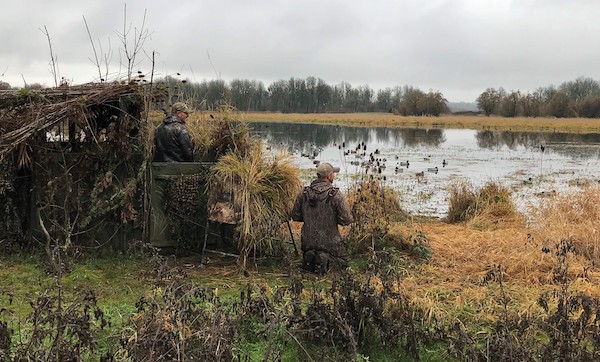Waterfowler’s Advice On Birder Interactions As Issues Arise
It’s murky, muddy, cold, there’s a brutal 20-mile-an-hour wind blowing off the bay, the decoys are bobbing nicely in the sheet water and flocks of ducks have been moving all morning … though it would be nice if a few more birds would drop in.
Then it happens. A Tesla pulls into the state wildlife area parking lot and out pops a couple in coats that don’t exactly blend in. Instead of shotguns, they’re armed with binoculars.
Birders.

The duo decide to walk out the trail you set up off of waaaaaaaay before first light – and had to talk some fellow ‘fowlers into the mutual benefits of them going to the far end instead of throwing out their dekes right next door – then shivered through dawn’s icy rain to bag one beautiful drake mallard and miss a couple more.
“Here we go again,” you sigh.
Granted, it is state land and thus open to hunters and other members of the public alike, but can’t they just do their birding after duck season closes, or on some blue-bird afternoon when the odds of pulling in quackers are long?!? With all the salmon restoration work going on in the estuaries, good duck hunting land is getting scarcer, so scoring this spot took some work and luck!
It’s a scenario that could lead to a lot of frustration, yelling, probably some name calling, maybe some mud-slinging – worst comes to worst, a call or calls to the powers that be.
But not so much for Northwest Sportsman‘s resident hardcore waterfowler MD Johnson. He tries to handle unexpected visitors tactfully, steering conversation toward what they might be looking for and then addresses what he’s up to.
“It’s been very pleasant. I’ve never had a confrontation – ‘I’m out here watching birds and you’re killing them!’ I’ve had real good conversations with nonhunters,” says the resident of Cathlamet on the birdy Lower Columbia.
Indeed, there are reasons hunters and other recreationalists are in the same place at the same time – a shared love of wild things, wild places, the outdoors, being in the weather, or just to get away from a damn screen for awhile.
And we have a lot more in common than you might think, especially with birders. Some years ago, I did a blog and an editor’s note in the magazine on the surprising results of a study that found there are no stronger supporters in all of conservation than hunters and birdwatchers. And if you’re a hunter-birder, look out. Imagine the potential productive partnership.
As we all know, waterfowler dollars and organizations have helped acquire and better manage an immense amount of wetland habitat for not only ducks and geese but other birds and marsh-obligate species, and while there isn’t a tax on birders’ binoculars like there is on shells and guns and stuff, that’s not to say they can’t or don’t also buy duck stamps or help or want to help the cause in other ways.
I’ve been struck by how one of the absolute strongest supporters of hunting on the Washington Fish and Wildlife Commission is a vegan birder. This fall she and I have been sharing our observations – big ol’ flocks of cedar waxwings bathing at my backyard fountain, a migratory hermit thrush for her.
The reason I bring all this up is that today I received a note from WDFW that there have been some issues around sharing state lands of late, particularly on the myriad units of the bird-rich Skagit Wildlife Area. Waterfowlers, birders and others have been generating questions as well as calls to agency game wardens in some cases, with some incidents potentially considered hunter harassment, while others might be misunderstandings about the rules around access to specific WDFW lands and/or the hunting regs.
(Welcome to the club: WDFW’s rules puzzle us, but I imagine it’s tougher from a non-sportsman’s perspective.)
It led the agency’s spokesfolks to put out a blog centered on better understanding hunting seasons and the different access programs out there, and it carries the reminder that “intentionally obstructing the lawful taking of fish, shellfish, or wildlife — including waterfowl and upland game birds — is a crime in Washington as detailed in our state’s ‘hunter harassment’ law RCW 77.15.210.“
That’s WDFW’s bolding, not mine, and in doing so they’re making a not-so-subtle point to nonhunters about unacceptable behavior during hunting season on public land. I’m told they’ll be sharing that message with local birders and organizations. Thank you, I appreciate that outreach.
To report harassment or obstruction of legal hunting activities, WDFW advises you call them at (360) 902-2936 and choose option 1 or try the agency enforcement numbers at wdfw.wa.gov/about/enforcement/contact.
But the agency’s blog also notes, “Respectful communication and dialogue go a long way towards creating positive connections between outdoors enthusiasts and avoiding potentially negative encounters on our public lands.”
Which brings me back around to MD, our staff duck and goose hunter.
Johnson, who likes to hunt out-of-the-way public spots, initially tries to put birders, dog-walkers or whomever it is that he’s crossed paths with at ease.
“If I mention a non-game species I’ve seen – an egret, say, or a pair of bald eagles with their talons locked up – it immediately changes the direction of the conversation and you can see them smile. And then you talk about whatever where the conversation goes,” he says.
Maybe it’s just because he’s at the mentorship stage of being a sportsmen, or it’s his easy-going personality, but Johnson sees meetings in the marsh as a chance to be a good ambassador about our culture and heritage.
“Whether they’re birding or hiking, take it from an educational perspective. Don’t assume it’ll be a confrontation because often it’s not. I educate nonhunters about what I’m doing and why I’m doing it,” Johnson says.
Yeah, there’s always going to be that one belligerent this-is-public-land-I-don’t-care-that-you-got-here-at-4 a.m.-I’m-gonna-sit-down-right-here-and-count-little-brown-birds person, and there are some folks you’ll never reach, but here’s to better relations and understandings the whole way around.

